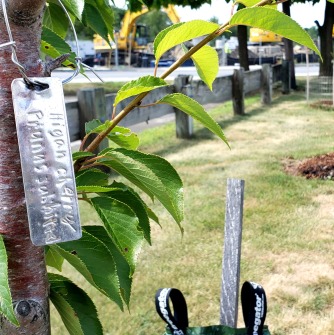| Contact |
Dustin Luca
|
|---|
SALEM, MASS. – A new wave of tree plantings is coming to Salem State University to help provide shade to Harrington Campus, after recent efforts to plant trees have been celebrated at other parts of SSU.
The Healey-Driscoll Administration announced last week that it’s investing more than $1 million in grants to support tree plantings and expand urban tree canopies in gateway cities, such as Salem and Lynn. For that, the two cities combined for a staggering $310,931 from the Greening the Gateway Cities (GGCP) implementation grant program.
Salem State’s share of the grant, worth $31,950, will bring 36 new trees to the Harrington Campus. That’s joined by $120,000 going to the City of Salem to plant 100 trees along entry routes, $123,981 to Lynn to plant 110 new public trees and prepare 80 new tree pits, and $35,000 to local non-profit Salem Sound Coastwatch to help recruit residential properties into the program and find other high-priority planting spots in the area.
Salem State recently partnered with the Department of Conservation and Recreation through the GGCP to plant 50 trees of diverse species on North Campus, at the O’Keefe Complex, Stanley Building, and along the bike path, with more trees to come this fall. The new grant funding allows the university to plant trees on the Harrington Campus, where students have specifically requested more trees. The Harrington Campus was previously ineligible for the GGCP, as it’s not within an environmental justice area.
Bringing trees to campus “is transforming the landscape of Salem State for the future and is an important part of Salem State’s climate resiliency strategy,” said Tara Gallagher, sustainability coordinator in the university’s facilities department. “They say the best time to plant a tree is 20 years ago, and the second-best time is today. So, it’s never too late.”
The program strives not just to plant trees, but to make sure those that are planted receive initial watering and treatment support, and that species planted are also diverse. For that, plantings last year brought Honeylocusts, Basswoods, Red Maples, and more in the areas around the Canal Street parking lots and the multiuse path that runs through the area.
“Planting trees in urban areas helps neighborhoods that lack tree canopy and suffer from the urban heat island effect of being hotter than surrounding areas in the summer,” Gallagher said. “Tree planting also brings stormwater management, wildlife habitat and other benefits, as well as beautifying our campus.”
Rebecca Tepper, secretary to the state’s Executive Office of Energy and Environmental Affairs, said expanding the state’s forest canopy “is one piece of the larger puzzle to combatting climate change in Massachusetts.”
“With continuous heat waves leading to higher energy bills and greater greenhouse gas emissions, our Greening the Gateway Cities Program leverages our state resources and engages residents to help plant trees and enhance public health,” Tepper said. “Reducing the urban heat island effect is a top priority, and our non-profit partnerships through the GGCP will help cool our neighborhoods, towns and cities.”
As part of its efforts to advance and educate on sustainability, the university is holding three events in August:
Tuesday, Aug. 6: Low Mow Zone Lunch and Learn at the Meier Hill Low Mow Zone, from 12 to 12:40 p.m. Meet Dean Brian Vanden Heuvel and Biology Professor Lynn Fletcher behind Meier Hall near the entrance to the faculty parking lot on College Drive. Learn what low mow zones are, why they are important, and how students will be interacting with these areas in their courses.
Thursday, Aug. 8: New Tree Plantings Lunch and Learn at the Stanley Building, 267 Canal St., from 12 to 12:40 p.m. Join Geography and Sustainability Professor Nicholas Geron and Sustainability Coordinator Tara Gallagher starting at the BlueBike Hub near the Stanley Building. Learn about the DCR urban tree planting program, why urban trees are so important in Environmental Justice areas, and how we are integrating the new trees into courses.
Thursday, Aug. 15: Pollinator Garden Afternoon Open House at Atlantic Hall, 71A Loring Ave., from 4 to 4:40 p.m. Join Sustainability Coordinator Tara Gallagher and Sustainability Intern Cat Canavan to enjoy the gorgeous flowers and learn about pollinator habitats.

